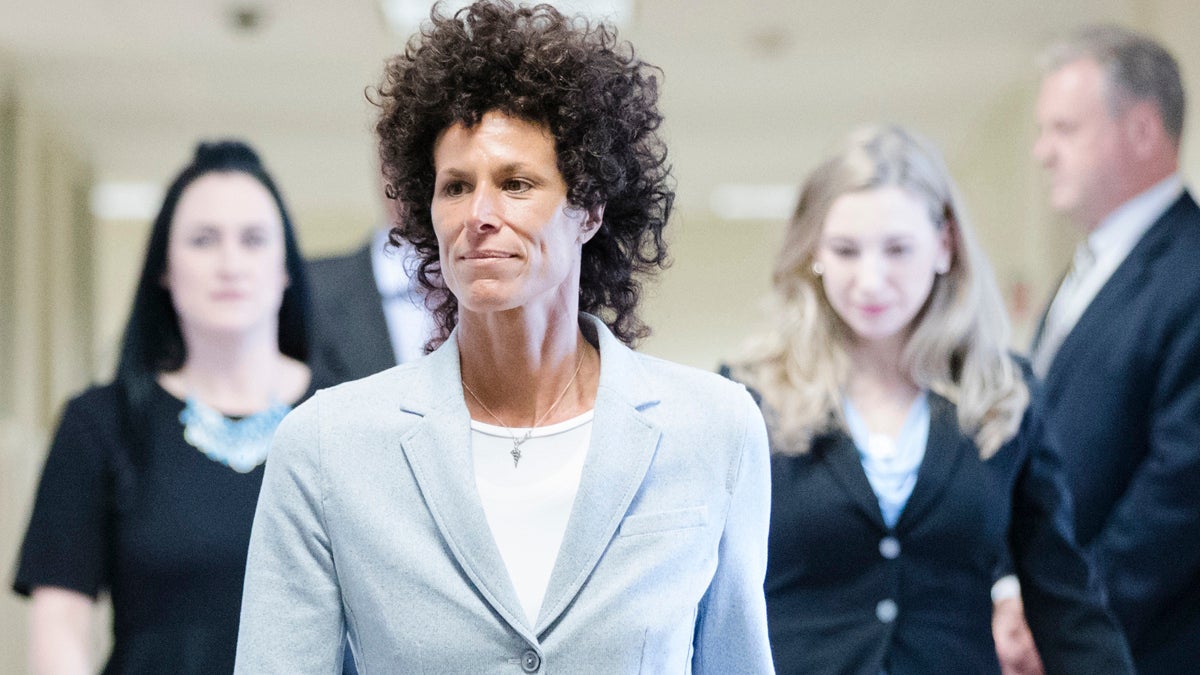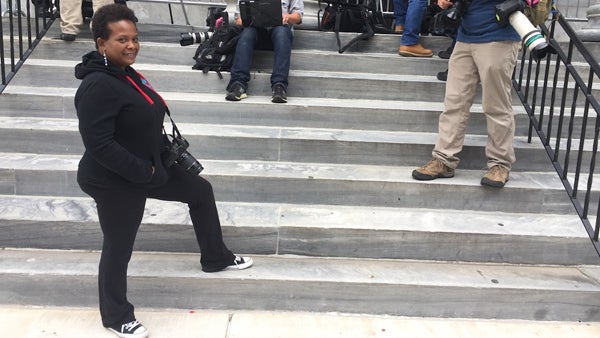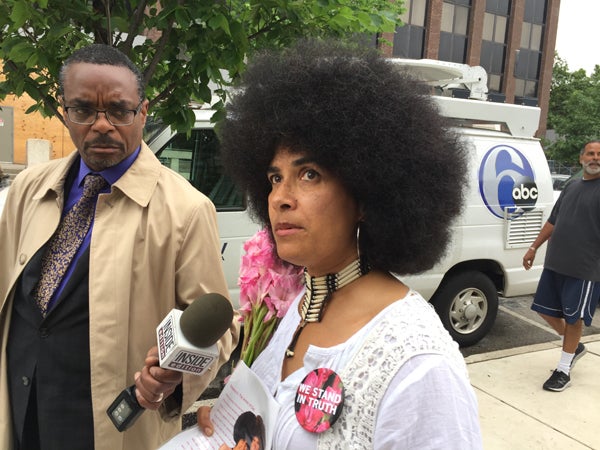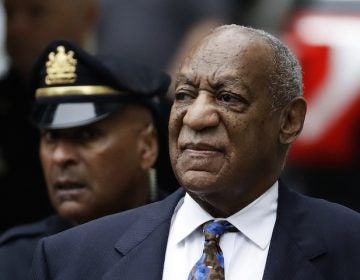Cosby Trial: Day 2

Andrea Constand walks to the courtroom during Bill Cosby's sexual assault trial at the Montgomery County Courthouse in Norristown, Pa., Tuesday, June 6, 2017. (Matt Rourke/AP Photo, Pool)
Andrea Constand, the alleged victim in Bill Cosby’s sexual assault trial, testified Tuesday that the legendary entertainer plied her with three pills and wine, then groped her while she was incapacitated at his suburban Philadelphia mansion in 2004.
In testimony that marked the first time she has spoken publicly about her fateful encounter with Cosby, the 44-year-old Toronto resident and former professional basketball player said she considered Cosby a mentor and had dined with him previously at his Cheltenham Township home.
But on the night in question, Constand said Cosby gave her three blue pills he claimed were a natural remedy to ease her stress about a looming career change but they made her woozy and helpless to resist as he molested her.
“In my head, I was trying to get my hands to move or my legs to move, but I was frozen. … I wasn’t able to fight in any way,” she testified.
Constand was calm and collected, looking at the jury as she began describing the assault under a prosecutor’s questioning. Cosby leaned in to listen, whispered to his lawyer and shook his head.
Under cross-examination, Cosby’s lawyers tried to poke holes in Constand’s story, citing differences between her courtroom testimony Tuesday and the accounts she gave to police and in a civil deposition in 2005.
Listen to the latest episode of WHYY’s podcast, ‘Cosby Unraveled.’
Constand, former director of basketball operations for Temple University women’s team, is one of more than 60 women who had accused Cosby of drugging and sexually assaulting them over a half-century. Yet her case is the only one to result in criminal charges, primarily because the statute of limitations expired in other jurisdictions where the alleged attacks occurred.
Cosby, a comedian who starred in the hit sitcom “The Cosby Show” in the late 1980s and early 1990s, is an influential Temple alumnus, booster and former Board of Trustees member.
Constand first told Canadian authorities in January 2005 about her sexual encounter with the legendary comedian and actor. She reached a confidential settlement in a lawsuit she brought against Cosby.
Two days before Pennsylvania’s statute of limitations was set to expire in December 2015, prosecutors charged Cosby with three counts of aggravated indecent assault, a second-degree felony. The trial is being heard by a jury brought in from Allegheny County, about 300 miles from the courthouse.
Cosby, 79, who has denied all of the allegations from women who claim he abused them, has said in a deposition that the sex acts that night Constand were consensual, “somewhere between permission and rejection.” If convicted, Cosby could spend up to 10 years in prison on each count, according to Pennsylvania law.
‘I told her Mr. Cosby sexually violated me’
Wearing a light blue blazer and white slacks, the tall, lanky Constand strode into the Montgomery County Courthouse in Norristown on the trial’s second day. About 2 p.m. she took the witness stand and spent about three hours — mostly composed but occasionally fighting back tears — first answering prosecution questions and later getting cross-examined by the defense.
On the stand Tuesday, Constand detailed her friendly relationship with Cosby that dated to 2002, when they met at a Temple game, and then pivoted to the night in question in January 2004.
Over time during her tenure at Temple, Cosby arranged get-togethers with Constand, during which the comedian would offer career advice over meals at restaurants and at his home. To Constand, Cosby became mentor and acquaintance, but she had said it was never a romantic connection. Constand is a lesbian and was dating women while her bond to Cosby developed.
After the attack, Constand said she kept silent for a long time but eventually told her mother after having a bad dream and waking up crying.
“I told her Mr. Cosby had sexually violated me, and he had given me three blue pills, and that I did not consent to what he did to me,” Constand testified.
“She knew I was pretty upset about it. She wanted to know what he had given me that put me in the state I told her about.”
She also testified about a call she and her mother had with Cosby.
“We began speaking, and I told Mr. Cosby exactly what I remember about the evening,” she said.
She Cosby worried that perhaps he had given her pills that were “something other than herbal, or natural.”
Asked if Cosby acknowledged having sexual contact with her, Constand said yes.
“He agreed with everything that I told him,” Constand testified. “And if I’m not mistaken, he said, again, with my mother on the telephone that he thought I had an orgasm.”
Detective: Constand ‘a little embarrassed’
Besides Constand, the prosecution called three other witnesses Tuesday:
- a Canadian police detective who first interviewed Constand in 2005 about her encounter with Cosby,
- the mother of another accuser, Kelly Johnson, who told jurors Monday about how Cosby abused her in 1996.
- a lawyer who took a deposition from Johnson in her workers compensation case against the William Morris talent agency, which also represented Cosby.
The state used Johnson because her account mirrored the allegations by Courtland. Johnson’s mother and the lawyer were called to bolster her account.
Listen to the latest episode of WHYY’s podcast, ‘Cosby Unraveled.’
David Mason, the Canadian detective, preceded Constand to the stand and testified about receiving the first official complaint from Constand that Cosby sexually abused her.
Mason, who specializes in sexual assault incidents, told jurors about receiving a call on Jan. 13, 2005 — about one year after former Temple University basketball official said she was drugged and molested by Cosby.
Mason said he was summoned to the home of Constand’s mother, who answered the door after Mason and two other Canadian police officers arrived.
He testified Constand brought out photographs of Cosby and her together. She said their friendship started while Constand met the famous Temple alumnus at a school game.
Mason noticed that Constand seemed “maybe a little nervous, maybe a little embarrassed” to share what came next: a description of a January 2004 visit to Cosby’s suburban Philadelphia home, ostensibly to discuss career moves over dinner but what instead devolved into a sexual attack.
She told Mason “something foreign” had been in her body, but was not specific. After all, Mason said, the three blue pills Cosby had given Constand incapacitated her, affecting her recollection.
Years later, prosecutors would assert in charging documents that Cosby had forcibly touched Constand while she was unconscious.
Mason recalled something else Constand told him about the night.
“She remembers the sound of his breathing,” he told the court. “She fell asleep. She woke up four in the morning. Went into the kitchen. He was wearing housecoat and slippers. She had a few bites of the muffin, then she left.”
On cross-examination, Cosby attorney Brian McMonagle reminded Mason of how Constand told Canadian detectives how there had been previous flirtations with Cosby, though “just out of humor,” never a serious romance.
McMonagle also raised a point that has been drawn out several times during the trial: Constand said she had all but cut off contact with Cosby after the alleged assault. She told Mason that, too.
Why had Constand waiting a year before going to authorities?” Cosby’s lawyer asked.
She was “embarrassed,” Mason told jurors, adding that “she knew his profile in the community and the school she worked at.”
Mother of other alleged victim testifies
The first witness Tuesday was Johnson’s mother Patricia Sewell.
Sewell said one of the reasons her daughter never reported Cosby to police was because her father, then a Los Angeles police detective, did not want the “shame and embarrassment” from accusing a celebrity of a sex crime.
Johnson, a former assistant to a talent agent with William Morris, said the celebrity coerced her into taking an unknown pill at the Bel Air Hotel, rendering her semi-conscious and unable to move. She said he then placed her hand on his penis and used it to pleasure himself.
Sewell, an education professional who lives in Atlanta, repeated what she knew of this story and the effect the alleged incident had on her daughter.
“She changed considerably,” Sewell said of the anxiety and depression her daughter experienced. “It almost appears as if she folded in on herself. Her circle of friends became narrower.”
When pressed by Cosby attorney Angela Agrusa for her knowledge of the workers compensation claim Johnson filed against the talent agency, Sewell said she knew few details.
“You’re here today to help out your daughter, right?,” Agrusa asked.
After a long pause, Sewell said, “I’m here to tell what I know.”
The prosecution also called gravel-voiced former judge and workers compensation attorney Joseph Miller, who took a deposition that Johnson gave as a part of her claim against her employer, in which she cited Cosby as one source of her job stress.
“That certainly stood out to me,” said Miller, who said he had no prior indication that the entertainer was a part of her claim.
During the second day of interviewing Johnson, Miller said, she became tearful when recounting an invitation by Cosby to have lunch at the Bel Air hotel.
Miller said Johnson told him that after Cosby asked her to take a pill, she found herself in and out of consciousness when Cosby came on to her.
Recounting Johnson’s words, Miller said: “He had taken out his penis and put lubricant on his penis and wanted her to fondle him. And she didn’t want to do that. That I do remember.”
After Miller left the stand, prosecutors called a Canadian detective, who is now testifying about when Constand first reported Cosby incident to police in 2005.
Other victim said Cosby told her to ‘relax a little bit’
Johnson, the only witness Monday, met Cosby while working for William Morris. He was their star client, fresh off his monumental success from “The Cosby Show.”
Johnson told jurors that Cosby, whom she admired, befriended her. She told about the day in 1996 when he invited her to have brunch at a Bel Air bungalow hotel where he was staying. When she arrived, he was wearing a bathrobe and slippers. He gave her a glass of wine and a large white pill, she testified.
“He told me to relax a little bit,” the 55-year-old Atlanta woman said, choking back tears.
“Would I give you anything to hurt you? Trust me,” she testified, recounting his words.
She said she felt intimidated and planned to spit out the pill in the bathroom, but he gave her a glass of wine, and she swallowed it instead. In the bathroom she saw several prescription pill bottles. She could not tell which one he had given her, because she couldn’t read the labels and had lost a sense of time.
“I felt like I was underwater,” she testified.
When she left the bathroom, Cosby was on the bed. She laid on the bed, she said, and recalls her dress being pulled up from the bottom and down from the top, exposing her breasts. Cosby put lotion in her hand and made her touch his penis, she said, crying.
Asked if she remembered anything else, Johnson shook her said no, sobbing.
She said Cosby later called William Morris and said she was ungrateful and tried to get her fired. Even though her father was a retired Los Angeles police detective, Johnson “was afraid” to call authorities, she said.
Listen to the latest episode of WHYY’s podcast, ‘Cosby Unraveled.’
Cosby, wearing a dark suit and a yellow-striped tie, leaned forward and appeared to be listening intently during Johnson’s account, at times conferring with his attorney Brian McMonagle. His TV daughter, Keisha Knight Pulliam, who played the character Rudy Huxtable, stayed through the morning and escorted Cosby in and out of the courtroom. The actress was not in the courtroom Tuesday.
During cross-examination, Johnson said she did not take illegal drugs during the 1990s.
But McMonagle, challenged Johnson’s version of events based on human resources records from William Morris and a deposition Johnson gave in 1996. Johnson said then that her sexual encounter with Cosby occurred in 1990 — six years earlier than she said in court Monday.
“I don’t know why I would have said that,” Johnson testified. “I can tell you that I was bawling in that deposition and I didn’t want to tell anything about what happened.”
They also read from a report written by a human resources employee at William Morris. Those notes, taken after her alleged assault by Cosby, documented some of the problems Johnson had at work that eventually led to her firing.
Johnson was also questioned about her connection to attorney Gloria Allred and about media appearances she had done around the time that she came forward with her accusations.
She answered many defense questions with the words “I do not recall.”
Her repetition of that phrase led McMonagle to ask if she has “selective amnesia” for this case.
Serial predator or victim of falsely accused?
The case hinges not on physical evidence but on sworn statements made by the accuser and the accused.
In opening arguments, prosecutor Kristen Feden told the jury the case against Cosby is about “trust betrayed and the inability to consent.” She urged jurors to put aside what they think they know about the celebrity and focus instead on his “heinous” crime against Constand.
Reading at least nine times from Cosby’s deposition in a civil case brought by Constand in 2005, Feden tried to paint a picture of an older man who drugged and preyed on young women to gratify his sexual needs.
“There are not a lot of facts in dispute. There is no dispute that he gave her pills. There is no dispute that engaged in sexual conduct with her,” Feden said. “The question here is whether Andrea Constand had the ability to consent. And the answer to that question is no.”
Constand was not in court Monday.
McMonagle countered that Constand is an untrustworthy storyteller who has often contradicted herself. McMonagle insisted that Cosby and Constand had a romantic relationship and that their sexual encounter was consensual.
For instance, he said, Constand originally told police she didn’t contact Cosby after the incident, but she actually called him 53 times afterward. McMonagle also focused on a 2005 investigation into Constand’s accusations that did not bring charges. “A false accusation destroys a life,” he said.
He also directed the jury to focus on the stakes for Cosby. “We’re talking about an old man’s tomorrows,” he said.
“You will never see Mr. Cosby running from anything,” McMonagle said.
He said Constand and Cosby had a long-running romance.
“She bought him incense, bought him bath salts. They had dinner, had cognac and brandy and sipped in front of the fireplace,” McMonagle said. “She wasn’t paralyzed. She wasn’t incapacitated. They were romantic together.”
Prosecutors plan to put an expert on the witness stand to testify that survivors of sexual assault often have post-traumatic stress that can fog memories.
Fellow accuser in court to support Constand
The Cosby trial, seen as America’s most high-profile celebrity trial since O.J. Simpson was charged with killing his ex-wife and another man in 1994.
Among those in attendance both days at the Norristown courthouse has been high-profile California attorney Gloria Allred, who represents Johnson and many other women who have made allegations against Cosby.
Allred said Tuesday morning that she considered Monday a victory for the prosecution.
Cosby’s lawyer McMonagle, she said, “was very theatrical, which is what defense attorneys often do when they don’t know how to go about undermining the credibility of the witness.
“It was very rapid fire with no theme in mind. He was very brutal — if I was on the jury, I would be very turned off by that. I thought it went very, very well for the prosecution, and again, it’ll be up to the jury to decide the ultimate result.”

Tuesday’s media crowd was slightly smaller and gone were any celebrity cameos. He walked in with only his usual entourage of bodyguards.
He ignored reporters’ shouted questions, but did pause when a fan shouted, asking him to wish her a happy birthday.
“How old?” he asked supporter Monica Lyons, a freelance photographer whose son Nile was on “The Cosby Show.”
She replied that she is 49. He pretended to buckle in surprise, before continuing into the courthouse without looking at the crowd of reporters or photographers recording his every move.

Also in attendance both days — and carrying a bouquet of flowers — has been Cosby accuser Lili Bernard, a Los Angeles-based actress who said she came to support Constand, whom she befriended in 2014.
During a 2015 news conference, Bernard accused Cosby of giving her a drugged drink and raping her in the 1990s. Bernard played Mrs. Minifield on “The Cosby Show,” and also has appeared in “Seinfeld” and “Golden Years.”
Tuesday, Bernard told WHYY that Cosby “mentored me as a paternal figure” before she appeared on the show. “He often told me that he cared about me, as if I were his daughter, that I was one of his ‘kids,’ and then when finally I trusted him completely and adored him, he drugged me, raped me, and he threatened me to silence.”
Bernard said she has become “dear friends” with Constand and attended the trial “to stand in solidarity with her.” She said Monday’s testimony was “distressing,” because McMonagle “revictimized” Johnson during cross-examination.
“She did a phenomenal job. She was steadfast and strong, even in the face of being revictimized on the stand, so my heart went out to her.”
She added: “That is how our rape culture works, but I’m hoping that my speaking out and the speaking out of the 60 of us who have gone public will help to shift rape culture toward believing the victims and away from this victim-blaming, which we see in the courtroom.”
Caroline Heldman, who heads a group called End Rape Statute of Limitations, accompanied Bernard into court.
“I’m here to show solidarity with the Cosby survivors, many of whom are here with us in spirit but couldn’t make it in person,” Heldman said. “It’s a tightknit community of Cosby survivors.”
Liz Marsella, 72, who lives around the block from the courthouse, wandered outside before court Tuesday to gawk at the gaggle of reporters giving live reports and doing interviews.
Marsella fondly remembers Cosby as Dr. Huxtable, but isn’t sure what to think now.
“He was a good man, but it’s just one of those unfortunate things that happened,” Marsella said.
“I really don’t want to judge. I wasn’t there, I don’t know. And not only that, but the lady should have reported it right away. But she waited a year. So what does that tell you?”
—
WHYY reporters Bobby Allyn, Laura Benshoff, and Dana DiFilippo, and The Associated Press contributed to this story.
WHYY is your source for fact-based, in-depth journalism and information. As a nonprofit organization, we rely on financial support from readers like you. Please give today.




